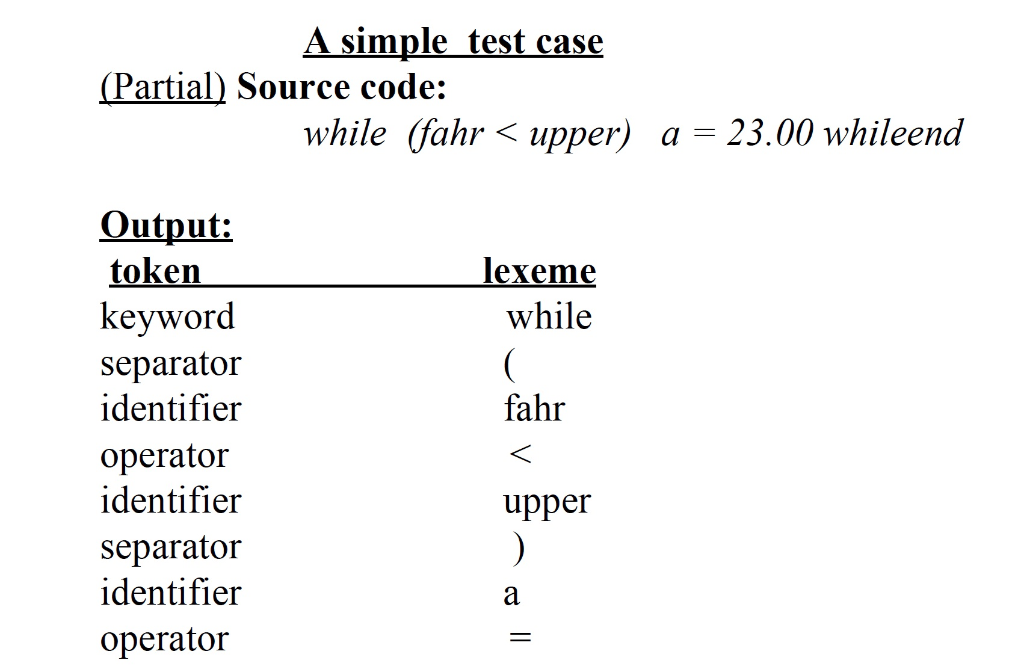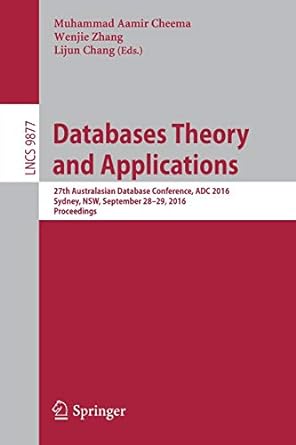Question
Hi, Could you help me to covert this python code to C++? This code is working in python now. I want to learn that how
Hi,
Could you help me to covert this python code to C++? This code is working in python now. I want to learn that how to write C++ code. The purpose of this Python code is lexical analysis. Thank you so much!
Following is a simple test case

following is Python code:
from enum import Enum
import string
keyword = ['while', 'if', 'for', 'else', 'get', 'int', 'endif', 'return', 'put', 'function', 'real']
# %% checked later for separators
separator = ['(', ')', '[', ']', '{', '}', '!', ';', ',', ':']
class State(Enum):
REJECT = 0, 'REJECT'
INTEGER = 1, 'INTEGER'
REAL = 2, 'REAL'
OPERATOR = 3, 'OPERATOR'
SEPARATOR = 4, 'SEPARATOR'
IDENTIFIER = 5, 'IDENTIFIER'
KEYWORD = 6, 'KEYWORD'
UNKNOWN = 7, 'UNKNOWN'
SPACE = 8, 'SPACE'
def __new__(cls, value, name):
member = object.__new__(cls)
member._value_ = value
member.fullname = name
return member
def __int__(self):
return self.value
# still working on the states
stateTable = [
[0, State.INTEGER, State.REAL, State.OPERATOR, State.SEPARATOR, State.IDENTIFIER, State.KEYWORD, State.UNKNOWN, State.SPACE],
[State.INTEGER, State.INTEGER, State.REAL, State.REJECT, State.REJECT, State.IDENTIFIER, State.REJECT, State.REJECT, State.REJECT],
[State.REAL, State.REAL, State.UNKNOWN, State.REJECT, State.REJECT, State.REJECT, State.REJECT, State.REJECT, State.REJECT],
[State.OPERATOR, State.REJECT, State.REJECT, State.OPERATOR, State.REJECT, State.REJECT, State.REJECT, State.REJECT, State.REJECT],
[State.SEPARATOR, State.REJECT, State.REJECT, State.REJECT, State.REJECT, State.REJECT, State.REJECT, State.REJECT, State.REJECT],
[State.IDENTIFIER, State.IDENTIFIER, State.REJECT, State.REJECT, State.REJECT, State.IDENTIFIER, State.REJECT, State.REJECT, State.REJECT],
[State.KEYWORD, State.REJECT, State.REJECT, State.REJECT, State.REJECT, State.REJECT, State.REJECT, State.REJECT, State.REJECT],
[State.UNKNOWN, State.UNKNOWN, State.UNKNOWN, State.UNKNOWN, State.UNKNOWN, State.UNKNOWN, State.UNKNOWN, State.UNKNOWN, State.REJECT],
[State.SPACE, State.REJECT, State.REJECT, State.REJECT, State.REJECT, State.REJECT, State.REJECT, State.REJECT, State.REJECT],
]
def checkToken(token):
# print("Check Token", token)
if token.isdigit():
# print("is digit")
return State.INTEGER
elif token.isspace():
# print("is space")
return State.SPACE
elif token == '$':
return State.IDENTIFIER
elif token == '.':
# print("is real")
return State.REAL
for i in string.punctuation:
if token == i:
if token in separator:
# print("is separator")
return State.SEPARATOR
# print("is punc")
return State.OPERATOR
if token.isalpha():
# print("is alpha")
return State.IDENTIFIER
else:
# print("is unknown")
return State.UNKNOWN
comment = False
def Lexer(expression):
global col, comment
tokens = []
col = State.REJECT
currentState = State.REJECT
prevState = State.REJECT
currentToken = ""
for token in expression:
col = checkToken(token)
currentState = stateTable[int(currentState)][int(col)]
# print("currentToken is ", currentToken, "currentState is ", currentState.fullname)
if currentState == State.REJECT:
currentToken = currentToken.replace(" ", "")
if prevState != State.SPACE and currentToken:
if currentToken == '!':
if comment:
comment = False
else:
comment = True
elif not comment:
if currentToken in keyword:
tokens.append({'token': currentToken, 'lexeme': State.KEYWORD})
elif prevState == State.IDENTIFIER and currentToken.find('$') > -1 and currentToken[len(currentToken)-1] != '$':
tokens.append({'token': currentToken, 'lexeme': State.UNKNOWN})
elif currentToken == '%%':
tokens.append({'token': currentToken, 'lexeme': State.SEPARATOR})
else:
tokens.append({'token': currentToken, 'lexeme': prevState})
currentToken = token
currentState = checkToken(token)
else:
currentToken = currentToken.replace(" ", "")
currentToken += token
prevState = currentState
if currentState != State.SPACE and currentToken and currentState != State.REJECT:
tokens.append({'token': currentToken, 'lexeme': prevState})
return tokens
filename = raw_input('Enter a input filename: ')
results = []
with open(filename) as inputfile:
for line in inputfile:
results.append(Lexer(line))
# print("Token\t\t=\tLexeme")
# for val in results:
# for r in val:
# if r['lexeme'].fullname == 'REAL':
# print("%s \t\t=\t %s") % (r['lexeme'].fullname, r['token'])
# else:
# print("%s \t=\t %s") % (r['lexeme'].fullname, r['token'])
# include output file
filename = raw_input('Enter a output filename: ')
with open(filename, "w+") as outputfile:
print >> outputfile, "Token\t\t=\tLexeme"
for val in results:
for r in val:
if r['lexeme'].fullname == 'REAL':
print >> outputfile, ("%s \t\t=\t %s") % (r['lexeme'].fullname, r['token'])
else:
print >> outputfile, ("%s \t=\t %s") % (r['lexeme'].fullname, r['token'])
Step by Step Solution
There are 3 Steps involved in it
Step: 1

Get Instant Access to Expert-Tailored Solutions
See step-by-step solutions with expert insights and AI powered tools for academic success
Step: 2

Step: 3

Ace Your Homework with AI
Get the answers you need in no time with our AI-driven, step-by-step assistance
Get Started


